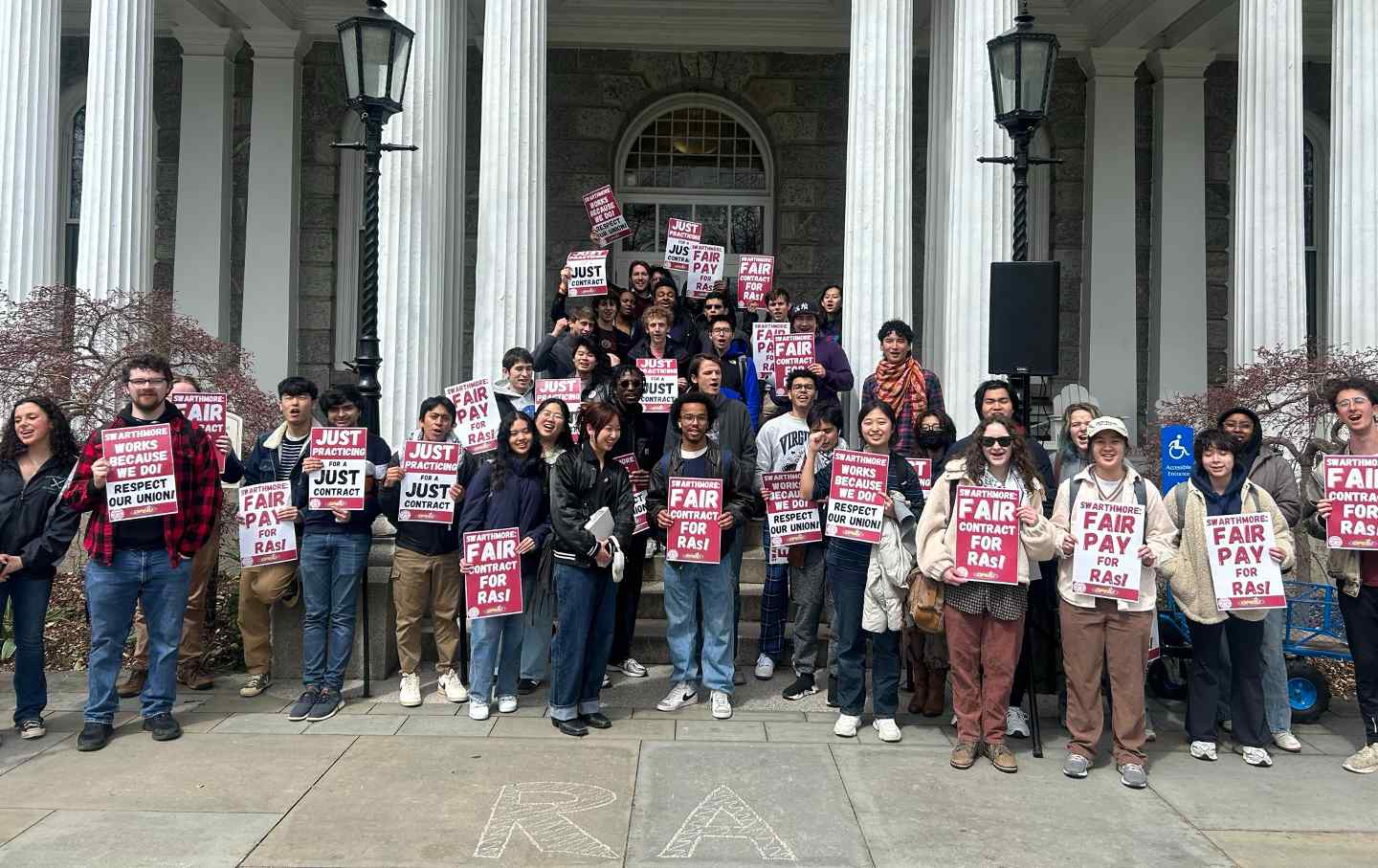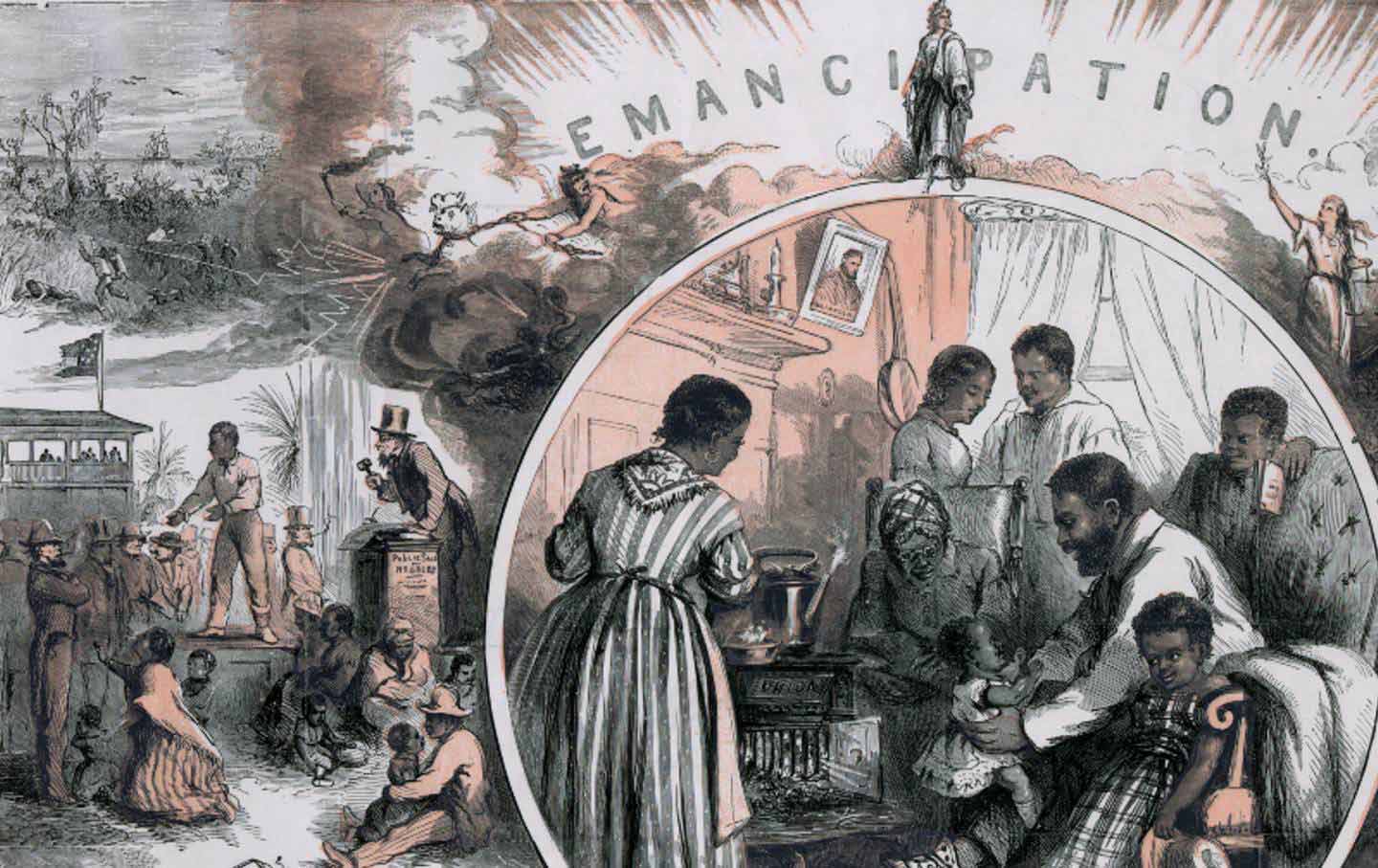Despite Bargaining Slowdowns, RA Unions Are Still Booming
As college costs continue to increase, undergraduate Residential Assistants are organizing for better pay and working conditions.

Swarthmore RAs gathered at a union rally on November 10, 2023.
(Aashish Panta)
When Mikaela Gonzalez was hired as a residential assistant (RA) at Swarthmore College in Pennsylvania, she was excited to foster community and trust in her dorm while simultaneously helping cover costs. However, she’d soon discover that the role of an RA was not as advertised.
She was not being paid enough to cover the cost of her dorm room—around $2,000 less than the $9,578 required—that serves as her workplace for constant on-call hours.
At many schools, financial aid is even considered RA compensation. At Georgetown University, RAs are paid anywhere from $1,000 if they receive financial aid to $20,000 if they do not.
Moreover, “the job itself is advertised as community-building, being there and building a sense of trust and communication with your residents,” Gonzalez said. “But when you look at the handbook and when you sign the contract, it does become clear that it is more of a surveillance job.”
Gonzalez and other Swarthmore RAs are not alone in their dissatisfaction with their role and compensation. As college costs continue to increase, many residential assistants are turning to unionizing for better pay and employer respect.
Across the United States, undergraduate RAs are organizing, helping form a historic wave of younger unionized employees. They’re demanding better pay, job security, hiring transparency, and respect from their employers, while arguing against the idea that housing costs are sufficient compensation. “Housing is simply an extension of our job,” said Bryce Merry, an RA and organizer at Bucknell University in Pennsylvania. “I am placed in a first-year dorm away from all my friends with no community of my own. I am basically on call for the students whenever they need me. I lose out on my friends, I lose out on my living situation, and I get that in exchange for this room being free.”
Hiring decisions are also an issue. According to two current RAs at Georgetown, some employees were not rehired this year for being three minutes late to meetings or clocking in for duty 10 minutes late. “We thought that was unfair,” said Sam Lovell, an RA and organizer at Georgetown.
Aayush Murarka, another Georgetown RA, had a fantastic year with a supportive community director—the full-time employee who oversees RAs—and wants to make sure his experience is common across the position. He has seen verbal abuse leveled at RAs along with seemingly arbitrary hiring decisions. “It was extremely dependent on who your community director or immediate supervisor was. Some people would get a quick meeting to clear up why someone checked into duty late. Other people would lose their job and therefore their entire education was at risk,” Murarka said. For many RAs, losing your job also means losing your housing. “It was extremely uneven and arbitrary in terms of how RAs were treated.”
RAs generally say their unionization is primarily directed toward the larger administration and housing system, not the area or community directors. At Swarthmore, three of the four area coordinators left in the middle of the 2023–24 academic year—leaving just one behind to manage all 56 RAs. Georgetown saw similar turnover, and noticed more variation in discipline and treatment with the newer hires, a major motivation for unionizing and creating stable rules.
Residential Assistant unionization campaigns have achieved historic success over the past two years, including job protections, sanctuary campuses, and new stipends. At Tufts, RAs bargained for a contract including 80 meal swipes and a $1,425 stipend, along with job protections dictating just cause for firings. “We won all those elections overwhelmingly, and I think what’s been clear is that there’s a strong demand for these workers to feel respected, to feel like the employer is listening to them. These workers want a seat at the table. They don’t want to be treated as kids. They don’t want to be treated disparagingly because of their age. They want fair pay,” said Scott Williams, an organizer with Office and Professional Employees International Union (OPEIU) Local 153, the umbrella union that has helped to form 11 RA unions and one student-worker union; the first schools to unionize include Barnard, Wesleyan, and Fordham.
Williams began organizing at the University of North Carolina, Chapel Hill, supporting efforts by full-time public-sector college employees. Since at that time student workers were not considered to have collective bargaining rights, a separate union for undergraduate workers was never considered possible. A 2016 National Labor Relations Board (NLRB) ruling recognized graduate and undergraduate students at private universities as employees, giving life to a new strategy. Wesleyan University RAs working with full-time physical plant employees were the first to form an undergraduate student worker union after receiving voluntary recognition from their employer.
Wesleyan has been the only school to grant voluntary recognition; the other dozen, such as Rensselaer Polytechnic and Emerson, have won union elections with overwhelming support ranging from 90 to 97 percent. For most students, this is their first time participating in a union, and RAs are feeling motivated to continue unionizing post-graduation in the workforce.
Williams has seen unions connect through OPEIU to create a movement of undergraduate labor organizers, but, despite the momentum, organizers have been challenged to secure meaningful action from administrations during bargaining. “Unless the workers build power and a credible threat, and really organize and keep up the pressure, these colleges have not always been willing to bargain fairly,” said Williams.
Swarthmore students faced particular resistance, according to OPEIU organizers and RAs. Initial contract proposals containing basic rights accepted quickly at other schools—such as the University of Pennsylvania—have been considerably rewritten in delayed bargaining meetings and met with demands for no-strike clauses in return at Swarthmore. The school has continued to insist that RAs are not employees, despite other institutions and the NLRB’s asserting that they are. OPEIU has filed two rounds of Unfair Labor Practice charges against Swarthmore: the first for sudden unjust disciplinary charges given to three workers the day before the election, and the second, in mid-May, for bargaining slowdowns.
In response, RAs at Swarthmore walked out of the second bargaining session. “The bargaining process has been primarily characterized by the school dragging their feet and delaying and generally attempting to waste our time,” said Christoper Folk, an RA and organizer at Swarthmore. “This is part of their strategy to wait us out and attempt to diffuse the energy we’ve built up through our organizing.”
At UPenn, the union had been at the bargaining table since last December, and hoped to finish the contract by the end of the 2023–24 academic year. Because RAs turn over annually, organizers feel the universities have been attempting to diminish union power by stalling. Eventually, on June 10, they unanimously ratified their first contract, which included a stipend of $3,000, 20 meal swipes, and a $750 contract ratification payment for spring 2024 workers.
At Georgetown, the union got more support in the secret-ballot election than in the prior petition of support, which Lovell attributes to less fear of retaliation, even though the petition signatures were also not revealed to the school. “It’s the fear of the institution turning its eye on you and you becoming a target,” said Folk, referring to sudden citations RAs who had been involved in bargaining received. “There has not been super direct, intense repression of the RAs who unionize. Although there is repression that exists, it hasn’t been threats of termination.”
Popular
“swipe left below to view more authors”Swipe →In 2019, the administration at Georgetown University announced pay raises for RAs the day the union was supposed to go public. After the pandemic hit, the RA contracts were terminated. Lovell is anticipating the slower bargaining that other unions have faced, but is looking forward to working with the school and stressed the union’s role as “non-adversarial.”
“We’re anticipating that it’s going to be a hard process. And that’s probably for the better. I mean, think about a contract that affects 103 people. I hope that it takes a while to talk through the nuances, that it’s a document that reflects the interests of every RA,” Lovell said. “I think it’ll be a bad thing if the university doesn’t agree with some simple terms—like no RA gets a pay cut. I think then you’re gonna see a lot of agitation.”
As the presidential election approaches, organizers fear a reshaped NLRB could undermine their strategy. If Trump wins in November, the 2016 ruling could be overturned, meaning private colleges would no longer be required to allow collective bargaining for student-employees. Lovell hopes remaining in dialogue with the university and pressing Georgetown to maintain its values as an institution will continue union recognition in the future regardless of national decisions. “I think it would be a really hard sell, not only to RAs but to the undergraduate body as a whole at Georgetown, to claim RAs weren’t employees and weren’t therefore entitled to being a member of a union.”
Swarthmore organizers are less hopeful: Clauses presented in a bargainning session on May 31 have refused to recognize RAs as employees and noted the potential NLRB changes, saying in “the event that the National Labor Relations Board or a federal court, or any equivalent entity should find that students serving as resident assistants do not qualify as employees under the National Labor Relations Act, this Agreement shall continue in force only until the date of its expiration, and then the College will have no further obligation to the Union.” OPEIU has pointed to these clauses as anti-union and anti-worker, and filed an unfair labor practice charge with the NLRB.
Regardless of national politics, Williams and OPEIU plan to continue building strong unions. “The biggest challenge we’re facing is not through the federal government’s National Labor Relations Board,” he said. “Our biggest challenge is with bargaining and the employers. Bargaining is a process that’s unfair, and where the employer maintains an unequal level of power.”
At Swarthmore, workers are steering the shape and pace of the contract, including solidarity efforts with the pro-Palestine encampment on campus and pushing back against the surveillance nature of the RA role that involves working with school safety. “We’re going to have to organize for any demands to be met, be it a better contract for RAs and other workers on this campus or for institutional divestment and to take power away from these unaccountable board members and administrators who work on their behalf,” said Folk.
“Our goal is to organize as many student workers into unions as possible. We think the best way to stop any kind of rollback of rights is to build the strongest union possible,” Williams said. “Our plan for that is not to be afraid or not to worry. It’s to keep organizing as rapidly and as strongly as possible.”
We cannot back down
We now confront a second Trump presidency.
There’s not a moment to lose. We must harness our fears, our grief, and yes, our anger, to resist the dangerous policies Donald Trump will unleash on our country. We rededicate ourselves to our role as journalists and writers of principle and conscience.
Today, we also steel ourselves for the fight ahead. It will demand a fearless spirit, an informed mind, wise analysis, and humane resistance. We face the enactment of Project 2025, a far-right supreme court, political authoritarianism, increasing inequality and record homelessness, a looming climate crisis, and conflicts abroad. The Nation will expose and propose, nurture investigative reporting, and stand together as a community to keep hope and possibility alive. The Nation’s work will continue—as it has in good and not-so-good times—to develop alternative ideas and visions, to deepen our mission of truth-telling and deep reporting, and to further solidarity in a nation divided.
Armed with a remarkable 160 years of bold, independent journalism, our mandate today remains the same as when abolitionists first founded The Nation—to uphold the principles of democracy and freedom, serve as a beacon through the darkest days of resistance, and to envision and struggle for a brighter future.
The day is dark, the forces arrayed are tenacious, but as the late Nation editorial board member Toni Morrison wrote “No! This is precisely the time when artists go to work. There is no time for despair, no place for self-pity, no need for silence, no room for fear. We speak, we write, we do language. That is how civilizations heal.”
I urge you to stand with The Nation and donate today.
Onwards,
Katrina vanden Heuvel
Editorial Director and Publisher, The Nation
More from The Nation

Mr. Scarborough Goes to Mar-a-Lago Mr. Scarborough Goes to Mar-a-Lago
The hosts of Joe Biden’s favorite political talk show have quickly pivoted to kissing the ring of the incoming president.

Watching a Parallel Media Try to Make Trump the Big Sports Story Watching a Parallel Media Try to Make Trump the Big Sports Story
The president-elect did not dominate the world of sports this weekend, but Fox News and Internet tabloids are inventing new realities.

The First Amendment Will Suffer Under Trump The First Amendment Will Suffer Under Trump
Given what’s heading our way, we need a capacious view and robust defense of the First Amendment from all quarters.

Slavery in an Age of Emancipation Slavery in an Age of Emancipation
Robin Blackburn’s sweeping history of slavery and freedom in the 19th century.

How Wisconsin Lost Control of the Strange Disease Killing Its Deer How Wisconsin Lost Control of the Strange Disease Killing Its Deer
Despite early containment efforts, chronic wasting disease has been allowed to run rampant in the state. That’s bad news for all of us.

The Prison Rodeo at the Heart of Legal Enslavement The Prison Rodeo at the Heart of Legal Enslavement
Angola prison workers make between 2 and 40 cents an hour. They also have a controversial outlet for recreation and to vend their wares at market rate: a rodeo.


